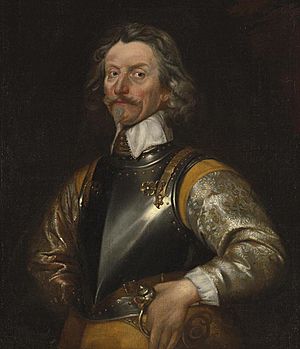Jacob Astley, 1st Baron Astley of Reading facts for kids
Quick facts for kids
The Lord Astley of Reading
|
|
|---|---|
 |
|
| Born | 1579 Melton Constable Hall |
| Died | February 1652 (aged c. 72) |
| Allegiance | Royalist |
| Rank | Major General of the Infantry |
| Battles/wars | Battle of Edgehill, Siege of Gloucester, First Battle of Newbury, Battle of Naseby, Battle of Stow-on-the-Wold |
Jacob Astley (1579-1652) was an important military leader during the English Civil War. He fought for the Royalists, who supported King Charles I. He was famous for his role in battles like the Battle of Newbury and the Battle of Naseby. Before the English Civil War, he also gained experience fighting in the Dutch Revolt and the Thirty Years' War. After the war, he retired and passed away in 1652.
Contents
Early Life and Military Training
Jacob Astley was born in 1579 at Melton Constable Hall in Norfolk, England. His family was well-known in the area. He began his military career at a young age.
First Experiences in War
When he was 18, Astley joined an expedition called the Islands Voyage in 1597. He sailed to the Azores with leaders like the Earl of Essex and Sir Walter Raleigh. This was his first taste of war.
Fighting in Europe
In 1598, Astley went to the Netherlands. There, he joined the armies of Maurice of Nassau and Henry of Orange. He fought bravely in the Dutch Revolt, which was a war for independence.
After this, he also fought in the Thirty Years' War. He served under important leaders like Frederick V, Elector Palatine and Gustavus Adolphus. He was so respected that when he left to serve Christian IV of Denmark, his position in the Dutch army was kept open for him.
Teaching Prince Rupert
In 1622, Astley joined the household of Elizabeth of Bohemia. She was the daughter of James I of England. Astley became a military tutor to her son, Prince Rupert. Prince Rupert would later become a key cavalry commander in the English Civil War.
Service to King Charles I
Jacob Astley returned to England with a strong reputation as a skilled soldier. King Charles I hired him for various military roles.
Preparing for Conflict
In 1639, Astley was made "Sergeant-Major-General" of the infantry. This meant he was in charge of organizing the foot soldiers. He went north to prepare defenses against a possible invasion from Scotland. At this time, there was growing unhappiness in England, which would soon lead to the Civil War.
He went north again in 1640 for the Bishops' Wars. He continued to serve the King, even as tensions grew higher.
The English Civil War
When the First English Civil War began in 1642, Jacob Astley immediately joined King Charles I. He was made Major-General of the Foot, leading the King's infantry. His former student, Prince Rupert, commanded the cavalry.
Battle of Edgehill
At the Battle of Edgehill, Astley famously said a prayer before the fighting began: "O Lord, Thou knowest how busy I must be this day. If I forget Thee, do not thou forget me." He then quickly gave the order, "March on, boys!"
Both sides' armies were not very well trained. Both the Royalists and the Parliamentarians claimed victory, but the battle ended without a clear winner. The war would continue for three more years.
Key Battles and Loyalty
Astley was a very loyal supporter of the King throughout the war. Even though his home region of East Anglia strongly supported Parliament, he stayed true to the Royalist cause.
He commanded a division at the Siege of Gloucester. At the First Battle of Newbury, he led the infantry for the King's army. In 1644, he served with Ralph Hopton at Arundel. He also helped defend Shaw House bravely at the Second Battle of Newbury.
King Charles I made him a baron for his service. At the Battle of Naseby, he again commanded the main infantry forces.
The Final Battle
Astley later fought in the west of England. With about 3,000 men, he fought hard at the Battle of Stow-on-the-Wold in March 1646. This was the last major battle of the First Civil War.
He surrendered to the Parliamentarians with memorable words: "Well, boys, you have done your work, now you may go and play—if you don't fall out among yourselves."
Later Life and Death
After the war, Jacob Astley was imprisoned for a time. However, he was later allowed to retire to Maidstone. He had given his word of honor not to fight again, so he did not take part in the Second English Civil War. He passed away in February 1652. His title as baron ended in 1688.
 | Jewel Prestage |
 | Ella Baker |
 | Fannie Lou Hamer |

